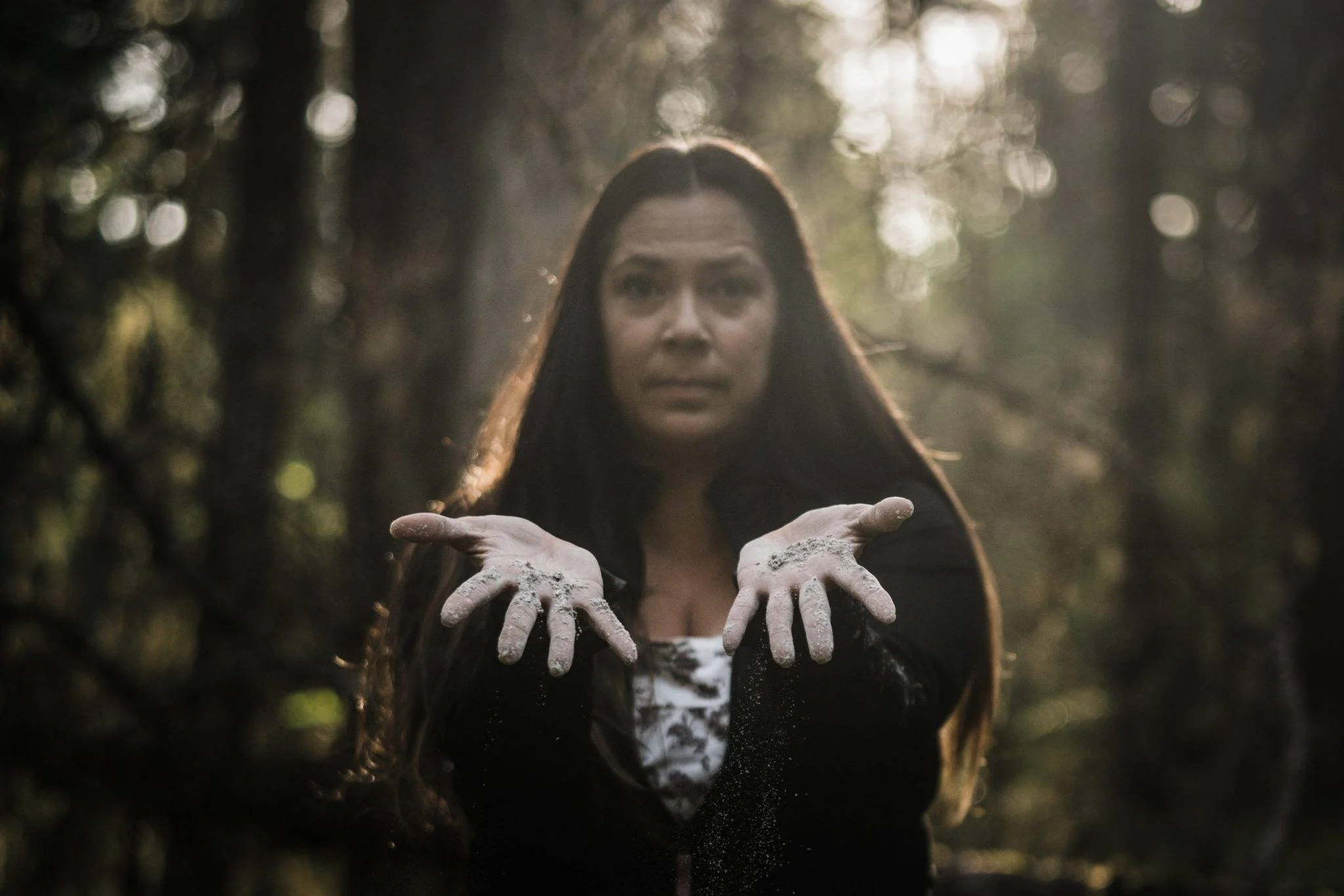Lil'wat playwright Yvonne Wallace celebrates and reclaims ancestral language in útszan (to make better)
Having its Vancouver premiere, the solo is in ucwalmícwts and English
útszan (to make better). Photo by David Ward
The Cultch presents Ruby Slippers Theatre’s útszan (to make better) by Yvonne Wallace from May 5 to 13 at the Vancity Culture Lab as part of the 2023 Femme Festival
LIL’WAT PLAYWRIGHT, STORYTELLER, and performer Yvonne Wallace (Ucwalmicw) was four years old when her great grandmother, mah7yeqs, died at age 116. The elder, who didn’t speak any English, spoke to Wallace in her mother tongue of ucwalmícwts, a language that the toddler knew only a few words of. The two nevertheless had a deep bond, and in a way ucwalmícwts keeps them connected to this day, with Wallace continuing to learn it as an adult.
“We had a way of communicating with each other, and whenever I think about her I think about how incredible that is,” Wallace tells Stir in a phone interview. “Not everyone has a memory like that. It makes me feel special.
“I think growing up in a Lil’wat home was the inspiration for me to learn our language,” she says. “It was often spoken in community gatherings. It was in my grandparents’ house with my aunts and uncles. My mother is a teacher of the language and has been since the day that I was born; she’s still teaching today. It’s part of me.”
Wallace draws from her own experiences to tell a story of language reclamation and family solidarity in útszan (to make better). While not a biographical work, the one-woman show (pronounced ooch-zan) centres on a woman named Auntie Celia, who is nearing the end of her life. Having had a heart attack, she makes a decision to have others accommodate her by refusing to speak English. Her niece, Margaret, realizes she’s embarking on a lifelong path of discovery as she learns how to think and speak in her ancestral first language. Whether she’s stumbling over words or stumbling through life itself, Margaret learns that love will always help her along.
The show came about while Wallace was doing her capstone project at Capilano University, where she earned a bachelor’s degree of liberal arts in 2019. Having premiered in Whistler that year and appeared at The Heart of the City Festival, ūtszan travelled to Whitehorse before the pandemic put a pause on touring. The Ruby Slippers Theatre production is now having its Vancouver premiere as part of The Cultch’s 2023 Femme Festival.
“I wanted to find a way to combine my experiences of being a language learner with my theatre background,” says Wallace. “Ūtszan was a good way to house one of my first fluency moments—when I was speaking full sentences and knowing what I was saying. It’s a personal story about identity issues and relationship to language, and the best return for me is when I’m able to share it with an audience. I’m paying my respects and acknowledging other people’s experiences through Margaret’s journey.”
Wallace first developed a passion for theatre while working at The Centre for Indigenous Theatre in Toronto went on to graduate from Humber College Theatre’s acting program with honours. She has since earned a master’s in education leadership at UBC. Her other plays include Smothered Sweetly, The Last Dance, cuzlhkán kalāxsa nqwal̛úttena (I will remember my language) (which had its pandemic-era film debut in 2021 at Touchstone Theatre’s Seismic Shift), and ReZonance.
Utszan unfolds in English and ucwalmícwts, and although there are no direct translations of the latter, those who don’t understand all of the words will still be able to follow. Wallace says that while people often refer to Indigenous languages as being on the verge of disappearing, she looks at it another way.
“I’m really rooted in the position that it’s not almost lost; it’s not facing extinction,” Wallace says. “I’m truly rooted in the fact that our language is here and we have recorded it and we have tools to reclaim it. That’s the heart of the piece.
“I think that people just need to hear how beautiful it is,” she adds. “We just need to have a deeper understanding of how beautiful this language is. It’s thousands of years old and has carried knowledge from the people before us. I’m doing my due diligence to acknowledge and honour that. I wouldn’t be in the place that I am had I not grown up in a community of trailblazers who had that very same vision by working with the language. I’m creating a benchmark of where we are and where we can go and where we can be. Hopefully audiences can go away learning a little bit more about themselves and their relationship to their own first languages.”














